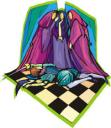 Until the close of the Medieval period, storytelling was archaic, in that it didn’t really represent what it was to be modern. Typical of archaic storytelling was Homer’s ‘Iliad.’
Until the close of the Medieval period, storytelling was archaic, in that it didn’t really represent what it was to be modern. Typical of archaic storytelling was Homer’s ‘Iliad.’
Describing the epic siege of Troy, it identifies the taking of Helen by Paris, yet rather than a love story, it is a political move. Human feelings do not really come into it.
The epic has many heroes, such as Achilles, Agamemnon and Hector, but their vocabulary does not really involve thinking on their part. Rather, they are pawns of the gods, with humanity playing the lesser role to such dictats. Human urges seem to be missing, as if mankind is irrelevant.
BIRTH OF PERSONALITY
What such stories lack is human personality. Yes, their primal urges may be catered for in the mentality of the gods, but the feelings do not extend downwards to the person. There is a hint of personality in some of the Biblical prophets, with human feelings occasionally placed centre stage, but nothing in terms of modernity.
The same can be said for ancient ballads and the original tales of King Arthur. Only as the Arthurian legend advanced towards the end of the Middle Ages does a new form of human personality arise. Many of the Knights seem to take on personalities, and the feelings between Guinevere and Lancelot are human.
This change in storytelling, adding real urges that can be said to be human, came in line with the intellectual revolt against a strict Christian orthodoxy. The Renaissance was soon to burst out, heralding human genius, but first there was Humanism and the idea that human affairs in this life were important, rather than life being the prelude to afterlife.
EXPRESSION OF HUMANITY
One of the first to express true humanity was the Italian poet, Petrarch. In his love poems he narrated true feelings, and even included infidelity. Soon, he was to influence one Geoffrey Chaucer, who’s ‘Canterbury Tales’ were a sudden burst of modernity. Here, we find real characters of all persuasions and with distinct personalities. Even the stories were modern, in that these characters were influenced into bizarre behaviour by their own emotions.
Soon the Renaissance was well under way and the Reformation was to break out, forming Protestantism as a protest against Catholic dogma. The power of the Church was waning in western Europe and people were beginning to be themselves. And it was inevitable that a point would come when humanity was finally, and completely, represented in storytelling.
SHAKESPEARE
That moment was the arrival of one William Shakespeare. In Hamlet and Macbeth, in King Lear and in Romeo and Juliet, human personality had arrived, complete with his base and romantic urges. Mankind was on the point of being allowed to be who he wanted to be. But it leaves a disturbing question.
We saw earlier how storytelling defined what it was to be human. Hence, it is arguably the case that as storytelling changed, it influenced what humanity was. Could we therefore say that, before Chaucer and Shakespeare, man was not human in the modern sense? If so, then storytelling CREATES what we are.
© Anthony North, July 2007
For more posts in the Story of the Story see History Page, above.
Click Tony On, on Blogroll, for my current affairs blog.
While you’re here, why not have a look around? Check out the pages – you’ll also find sub-domains on the Blogroll. Beyond the Blog is the site that has everything.